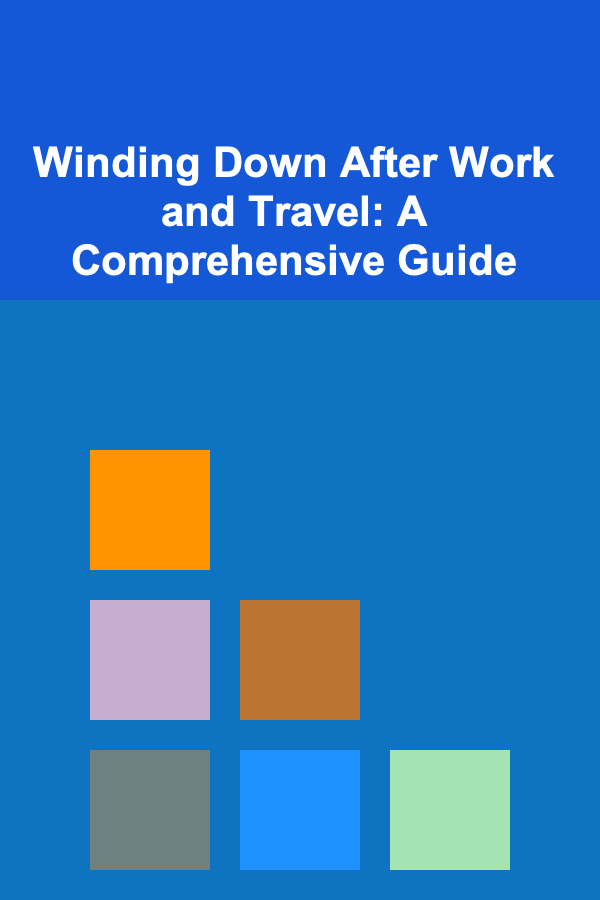
Winding Down After Work and Travel: A Comprehensive Guide
ebook include PDF & Audio bundle (Micro Guide)
$12.99$9.99
Limited Time Offer! Order within the next:

In today's fast-paced world, the lines between work and travel have become increasingly blurred. Many individuals now engage in "workations," remote work while exploring new destinations, or business trips that require significant travel. While the prospect of combining professional responsibilities with the allure of travel can be incredibly exciting, it also presents unique challenges to mental and physical well-being. The constant shifts in environment, demanding work schedules, and potential jet lag can leave you feeling drained and overwhelmed. Therefore, developing effective strategies for winding down after a day of work and travel is crucial for maintaining productivity, reducing stress, and fully enjoying the benefits of this lifestyle. This comprehensive guide explores various techniques and approaches to help you transition from the demands of work and travel to a state of relaxation and rejuvenation.
Understanding the Unique Challenges of Work and Travel
Before diving into relaxation techniques, it's essential to acknowledge the specific stressors associated with combining work and travel:
- Jet Lag and Sleep Disruption: Crossing time zones disrupts your body's natural circadian rhythm, leading to fatigue, difficulty concentrating, and digestive issues.
- Environmental Changes: Adapting to new climates, altitudes, and levels of air pollution can put a strain on your immune system and energy levels.
- Constant Stimulation: Exploring new places involves a constant barrage of sensory input, which can be mentally exhausting.
- Limited Personal Space and Privacy: Staying in hotels, hostels, or shared accommodations can limit your personal space and opportunities for quiet reflection.
- Difficulty Maintaining Routine: Travel often disrupts regular routines for exercise, nutrition, and sleep, which can negatively impact your overall well-being.
- Work-Life Imbalance: The temptation to constantly check emails and respond to work requests can make it difficult to disconnect and fully enjoy your travel experience.
- Loneliness and Isolation: Traveling alone or away from family and friends can lead to feelings of loneliness and isolation.
- Unexpected Delays and Disruptions: Flight delays, cancellations, and other travel-related disruptions can add to stress levels and disrupt your schedule.
By understanding these challenges, you can proactively address them and develop strategies to mitigate their impact.
Creating a Post-Work and Travel Wind-Down Routine
Establishing a consistent wind-down routine is key to signaling to your body and mind that it's time to relax. This routine should be tailored to your individual preferences and needs, but here are some general guidelines:
1. Disconnect from Technology
One of the most important steps is to disconnect from technology. The constant stream of emails, notifications, and social media updates can keep your mind racing and prevent you from fully relaxing. Consider these strategies:
- Set boundaries: Establish specific times when you will check your email and avoid checking it outside of those times.
- Turn off notifications: Disable push notifications for email, social media, and other apps that tend to grab your attention.
- Use a digital detox app: Several apps can help you limit your screen time and block distracting websites and apps.
- Create a technology-free zone: Designate a specific area in your accommodation (e.g., your bedroom) as a technology-free zone.
2. Engage in Mindful Relaxation Techniques
Mindfulness practices can help you focus on the present moment and quiet your racing thoughts. Some effective techniques include:
- Meditation: Even a few minutes of daily meditation can significantly reduce stress and improve focus. Use a guided meditation app or simply focus on your breath. Consider using apps like Calm, Headspace, or Insight Timer. These offer a variety of guided meditations, from short mindfulness exercises to longer, more in-depth sessions.
- Deep Breathing Exercises: Simple breathing exercises, such as diaphragmatic breathing or box breathing, can help calm your nervous system. Diaphragmatic breathing involves taking slow, deep breaths from your abdomen, while box breathing involves inhaling for four counts, holding your breath for four counts, exhaling for four counts, and holding your breath again for four counts.
- Yoga or Stretching: Gentle stretching or yoga can help release tension in your muscles and promote relaxation. Many hotels offer yoga classes, or you can find online videos to follow. Pay attention to your body and avoid pushing yourself too hard. Focus on poses that promote relaxation, such as Child's Pose, Cat-Cow, or Legs-up-the-Wall Pose.
- Progressive Muscle Relaxation: This technique involves tensing and releasing different muscle groups in your body, one at a time, to relieve tension. Start with your toes and work your way up to your head, consciously focusing on the feeling of relaxation as you release each muscle group.
- Body Scan Meditation: This involves systematically bringing your attention to different parts of your body, noticing any sensations without judgment. It can help you become more aware of tension and discomfort that you may be holding in your body.
3. Create a Relaxing Environment
Your surroundings can significantly impact your ability to relax. Make an effort to create a calming and comfortable environment:
- Dim the lights: Soft lighting can help promote relaxation and prepare your body for sleep.
- Play soothing music: Choose calming music or nature sounds to create a peaceful atmosphere. Avoid listening to anything too stimulating or upbeat.
- Use aromatherapy: Certain essential oils, such as lavender, chamomile, and sandalwood, have calming properties. Use a diffuser or add a few drops to a warm bath.
- Adjust the temperature: Ensure the room is at a comfortable temperature. A slightly cooler temperature is generally conducive to sleep.
- Declutter your space: A cluttered environment can contribute to stress and anxiety. Take a few minutes to tidy up your space and create a sense of order.
4. Engage in Enjoyable Activities
Make time for activities that you find enjoyable and relaxing:
- Read a book: Escape into a good book and let your mind wander. Choose a light and engaging read rather than something too intellectually stimulating.
- Listen to a podcast: Enjoy a relaxing podcast on a topic you find interesting. Avoid listening to podcasts that are too intense or thought-provoking.
- Take a bath or shower: A warm bath or shower can help soothe your muscles and relax your mind. Add Epsom salts or essential oils for added relaxation.
- Journaling: Writing down your thoughts and feelings can help you process your experiences and release stress. Focus on writing about positive experiences or expressing gratitude.
- Engage in a creative hobby: Spend time on a creative hobby, such as painting, drawing, knitting, or playing a musical instrument.
- Explore your surroundings: A gentle walk or visit to a park can be a great way to de-stress, but keep it relaxing. Avoid strenuous activities that might further tire you.
5. Prioritize Sleep Hygiene
Getting enough sleep is crucial for recovering from the demands of work and travel. Follow these sleep hygiene tips:
- Establish a regular sleep schedule: Try to go to bed and wake up at the same time each day, even on weekends, to regulate your body's natural sleep-wake cycle.
- Create a relaxing bedtime routine: Follow the same routine each night to signal to your body that it's time to sleep. This might include taking a warm bath, reading a book, or listening to calming music.
- Optimize your sleep environment: Ensure your bedroom is dark, quiet, and cool. Use blackout curtains, earplugs, or a white noise machine to block out distractions.
- Avoid caffeine and alcohol before bed: These substances can interfere with sleep.
- Limit screen time before bed: The blue light emitted from electronic devices can suppress melatonin production, making it harder to fall asleep.
- Consider melatonin supplements: Melatonin is a hormone that regulates sleep. If you're struggling to fall asleep, you can try taking a melatonin supplement. However, consult with your doctor before taking any supplements.
Specific Strategies for Combating Jet Lag
Jet lag is a common and disruptive consequence of travel across time zones. Here are some strategies to minimize its impact:
- Adjust your sleep schedule gradually: A few days before your trip, start gradually adjusting your sleep schedule to match the time zone of your destination. Go to bed and wake up earlier or later, depending on which direction you're traveling.
- Stay hydrated: Dehydration can worsen jet lag symptoms. Drink plenty of water before, during, and after your flight.
- Avoid alcohol and caffeine during your flight: These substances can disrupt your sleep and exacerbate jet lag symptoms.
- Eat light meals: Avoid heavy, greasy meals, which can be difficult to digest and can make you feel sluggish.
- Get some sunlight: Exposure to sunlight can help reset your body's circadian rhythm. Try to spend some time outdoors during the day, especially in the morning.
- Use a light therapy lamp: If you can't get enough natural sunlight, you can use a light therapy lamp to help regulate your circadian rhythm.
- Consider using a jet lag app: Several apps are designed to help you combat jet lag by providing personalized recommendations for sleep schedules, light exposure, and other strategies. Examples include Timeshifter and Entrain.
- Be patient: It takes time for your body to adjust to a new time zone. Be patient with yourself and allow yourself time to recover.
The Importance of Physical Activity
While you need to wind down, incorporating some light physical activity into your wind-down routine can actually help. It's about finding the right balance. Avoid intense workouts right before bed, but gentle movement can relieve tension and improve sleep.
- Walking: A leisurely walk around your neighborhood or hotel can do wonders. It gets you out in the fresh air (if possible), helps clear your head, and aids digestion after dinner.
- Yoga or Stretching: As mentioned earlier, gentle yoga or stretching can relieve muscle tension and promote relaxation. Focus on restorative poses.
- Swimming: A gentle swim can be incredibly relaxing, especially in a warm pool or jacuzzi. The buoyancy of the water can relieve pressure on your joints and muscles.
- Tai Chi or Qigong: These ancient Chinese practices involve slow, deliberate movements and deep breathing, which can help calm the mind and body.
The key is to keep the activity light and enjoyable. Listen to your body and avoid pushing yourself too hard. The goal is to gently release tension and promote relaxation, not to exhaust yourself further.
Maintaining a Healthy Diet
Travel often disrupts healthy eating habits, leading to processed foods, irregular meal times, and overindulgence. However, nutrition plays a crucial role in your ability to recover from the demands of work and travel. Focus on:
- Hydration: Carry a reusable water bottle and drink plenty of water throughout the day. Dehydration can worsen fatigue, headaches, and other symptoms.
- Whole, Unprocessed Foods: Prioritize fruits, vegetables, lean proteins, and whole grains. These foods provide essential nutrients and energy without the added sugars, unhealthy fats, and preservatives found in processed foods.
- Regular Meal Times: Try to maintain regular meal times, even when traveling. This helps regulate your blood sugar levels and prevents energy crashes.
- Avoid Overeating Before Bed: Eating a heavy meal before bed can interfere with sleep. Opt for a light snack, such as a piece of fruit or a handful of nuts, if you're feeling hungry.
- Limit Sugar and Caffeine: These substances can disrupt sleep and exacerbate anxiety.
- Probiotics: Travel can disrupt your gut microbiome. Consider taking a probiotic supplement or eating probiotic-rich foods, such as yogurt or kefir, to support digestive health.
Planning your meals in advance and packing healthy snacks can help you stay on track with your nutrition goals while traveling.
Seeking Support and Connection
Traveling and working remotely can sometimes lead to feelings of loneliness and isolation. Make an effort to stay connected with loved ones and seek support when needed:
- Schedule regular calls or video chats with family and friends: Set aside time each week to connect with the people you care about.
- Join online communities: Connect with other remote workers or travelers in online forums or social media groups.
- Meet locals: Attend local events or activities to meet new people.
- Seek professional help if needed: If you're struggling with stress, anxiety, or depression, don't hesitate to seek professional help from a therapist or counselor. Teletherapy options can be particularly convenient for those who travel frequently.
- Practice Self-Compassion: Be kind to yourself. Acknowledge that combining work and travel is challenging, and it's okay to have moments of feeling overwhelmed or stressed. Treat yourself with the same compassion you would offer a friend in a similar situation.
Remember that taking care of your mental and emotional well-being is just as important as taking care of your physical health.
Adapting Your Routine to Different Destinations
While establishing a consistent wind-down routine is beneficial, it's also important to be flexible and adapt your routine to the specific circumstances of each destination. Consider these factors:
- Time Zone: Adjust your sleep schedule and meal times gradually to adapt to the local time zone.
- Climate: Adjust your clothing and activities to suit the local climate. If it's hot and humid, opt for light, breathable clothing and avoid strenuous activities during the hottest part of the day.
- Culture: Be respectful of local customs and traditions.
- Accommodation: Adapt your routine to the amenities and limitations of your accommodation. If you're staying in a small hotel room, you may need to be more creative with your exercise and relaxation routines.
- Available Resources: Take advantage of local resources, such as parks, gyms, spas, and cultural centers.
Being adaptable and resourceful will help you maintain a healthy and balanced lifestyle, no matter where you are in the world.
The Long-Term Benefits of a Consistent Wind-Down Routine
Investing in a consistent wind-down routine after work and travel yields significant long-term benefits, including:
- Reduced Stress and Anxiety: Regular relaxation practices help lower cortisol levels and promote a sense of calm.
- Improved Sleep Quality: A relaxing bedtime routine prepares your body for sleep and helps you fall asleep faster and sleep more soundly.
- Increased Energy Levels: Adequate rest and relaxation allow your body to recover from the demands of work and travel, leading to increased energy levels and improved productivity.
- Enhanced Mental Clarity: Taking time to disconnect and de-stress can improve focus, concentration, and decision-making abilities.
- Stronger Immune System: Chronic stress weakens the immune system. Regular relaxation practices can help strengthen your immune system and reduce your risk of illness.
- Improved Overall Well-being: By prioritizing self-care and relaxation, you can improve your overall sense of well-being and enjoy a more balanced and fulfilling life.
- Sustainable Work and Travel Lifestyle: Implementing effective wind-down strategies allows you to sustain a work and travel lifestyle for the long term, preventing burnout and ensuring you can continue to enjoy the benefits of this unique way of living.
Winding down after work and travel is not a luxury; it's a necessity for maintaining your health, well-being, and productivity. By incorporating these strategies into your daily routine, you can create a sustainable and enjoyable lifestyle that allows you to thrive both professionally and personally.

How to Organize a Book-Themed Party at Home for Book Lovers
Read More
How to Organize Charity Sewing Projects in Your Space
Read More
How to Set Up a Home Bar for a Perfect Cocktail Party
Read More
Maximizing Passive Income with Deep Learning Automation Tools
Read More
Analyzing Planetary Atmospheres: A Comprehensive Guide
Read More
How to Debug Common Blockchain Development Errors
Read MoreOther Products

How to Organize a Book-Themed Party at Home for Book Lovers
Read More
How to Organize Charity Sewing Projects in Your Space
Read More
How to Set Up a Home Bar for a Perfect Cocktail Party
Read More
Maximizing Passive Income with Deep Learning Automation Tools
Read More
Analyzing Planetary Atmospheres: A Comprehensive Guide
Read More